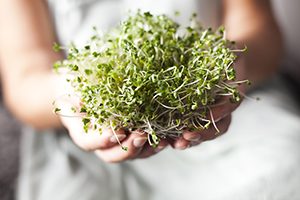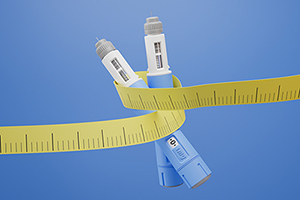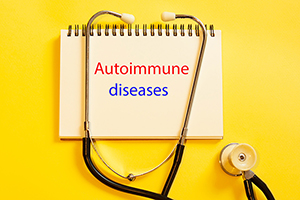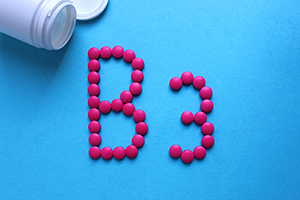



| By Dr. Ronald Hoffman
Sulforaphane is one of the most exciting nutrients in the integrative medicine armamentarium, harnessing the chemo-preventive benefits of cruciferous vegetables. It is no mere fad—its value is substantiated by numerous scientific studies.
 Young broccoli and cauliflower sprouts are a particularly rich source of sulforaphane, which is actually derived from a precursor compound called glucoraphinin (more on this later). It is also found in Brussels sprouts, cabbage, cauliflower, bok choy, kale, collards, Chinese broccoli, broccoli rabe, kohlrabi, mustard, turnip greens, radish, arugula, and watercress.
Young broccoli and cauliflower sprouts are a particularly rich source of sulforaphane, which is actually derived from a precursor compound called glucoraphinin (more on this later). It is also found in Brussels sprouts, cabbage, cauliflower, bok choy, kale, collards, Chinese broccoli, broccoli rabe, kohlrabi, mustard, turnip greens, radish, arugula, and watercress.
Excitement over the cancer-preventive properties of sulforaphane was first kindled in the early 1990’s with the work of Paul Talalay and associates at Johns Hopkins Medical School. His group demonstrated that sulforaphane is a potent inducer of detoxification pathways. Their work led to the development and commercialization of a potent source of sulforaphane: BroccoSprouts.
But the efforts of the Johns Hopkins group to claim proprietary rights over their own branded sulforaphane “BroccoSprouts” were overturned by a court decision that ruled that you can’t patent Mother Nature. Broccoli sprouts are now widely available under a variety of labels at supermarkets and natural food stores.
Meanwhile, other beneficial properties of sulforaphane have been demonstrated. Because it is a strong promoter of the body’s detoxifying antioxidant glutathione, new studies are pointing to its neuro-protective effects. It is an inducer of the anti-inflammatory Nrf2 pathway, and readily crosses the blood-brain barrier. This would make it potentially applicable to such conditions as stroke, traumatic brain injury, Alzheimer’s disease, and Parkinson’s disease.
And a recent study has created a sensation by showing that autistic subjects receiving sulforaphane had improvement in social interaction, abnormal behavior, and verbal communication.
In a recent Intelligent Medicine podcast, Dr. Leo Galland, author of “The Allergy Solution,” declared sulforaphane one of his favorite nutraceuticals for quenching allergies.
I recently had a wake-up call regarding sulforaphane. My favorite sulforaphane supplement, Broccomax, turns out not to be that bio-available. In a head-to-head comparison, subjects consumed either fresh broccoli sprouts vs. 6 capsules of Broccomax. Blood and urine samples were analyzed to reflect body levels of sulforaphane.
It was found that broccoli sprouts delivered far more sulforaphane than did Broccomax capsules; levels were 5-8 times higher! Why should that be if Broccomax is essentially freeze-dried broccoli sprouts?
It turns out that an enzyme called myrosinase, present in raw sprouts but destroyed by processing, is responsible for conversion of glucosinolates in cruciferous vegetables to bio-active sulforaphane. Studies have shown that cooking broccoli, even steaming it lightly for more than a minute, destroys much of the myrosinase activity, rendering it a far less potent source of sulforaphane. While intestinal bacteria have some ability to synthesize myrosinase, many individuals lack this ability, particularly if they have imbalanced flora.
When it comes to consuming cruciferous vegetables, the work-around is to consume them raw or very lightly braised. Alternatively, you can amp up delivery of sulforaphane by consuming cabbage family vegetables with a tangy dressing or garnish made of freshly-grated wasabi, daikon, or horseradish—all rich sources of myrosinase.
Try kale salad, or cauliflower or broccoli with a healthy dip, or fresh coleslaw (for variety, try making it with red cabbage orbroccoli stems.
Of course, glucoraphinins from cruciferous vegetables have the potential to be goitrogens—blockers of thyroid function. But you’d have to eat massive amounts to have a demonstrable effect on your thyroid, a topic I covered in a recent article.
What if you’re one of the estimated 40 percent of adults that surveys show have an aversion to broccoli and related cabbage family vegetables? Perhaps you’re a bitter-taster—a genetic trait that increases the tongue’s sensitivity to the intense flavors of plant polyphenols. Or, alternatively, maybe you’re one of the many who get gas and indigestion from the plentiful oligosaccharides in crucifers (the “O” in the FODMAP elimination diet that alleviates IBS). The high sulfur content of cabbage family food can also contribute to foul flatus.
In view of the myrosinase/bioavailability question, can we still rely on supplements to satisfactorily augment sulforaphane levels? The answer, fortunately, is yes, according to a recent study.
The trial demonstrates that a supplement rich in glucoraphinin derived from broccoli seeds matches broccoli sprout extract for sulforaphane bioavailability. The supplement used was OncoPLEX by Zymogen (call the Hoffman Center for availability).
Interestingly, this new delivery system for sulforaphane was studied by the same team at Johns Hopkins, under Dr. Paul Talalay, that brought this versatile chemo-preventive nutraceutical to the public’s attention nearly 25 years ago.
Unlike living raw sprouts, the supplement doesn’t contain myrosinase, which can’t be encapsulated because it’s only active when fresh. But OncoPLEX was shown to deliver sufficient glucoraphinin for most individuals to convert it to clinically-relevant amounts of bio-available sulforaphane when acted on by their intestinal bacteria.
The solution for those desiring a cancer-shielding, brain-protective nutrient with overall detoxifying benefits? Hedge your bets by consuming raw and lightly-cooked cabbage family vegetables or sprouts, together with a daily dose of OncoPLEX.
(For a discussion about another of broccoli’s beneficial compounds, see my recent clinical focus on DIM)
Though we think of declining estrogen as the hallmark of menopause, it's actually common for…

Up to 12 percent of Americans have ulcers at some point in life. Peptic ulcers…
Gallbladder disease is a modern illness. An estimated 20 million Americans have gallbladder disease. The…

New, more powerful weight loss drugs: Drugs like Wegovy, Rybelsus, Ozempic and Mounjaro/Zepbound are revolutionizing…

According to the Lancet, autoimmune disease affects one in ten people globally and it’s now…

This past week we were regaled with headlines like: High levels of niacin may increase…

Leyla Weighs In: The Erosion of Trust in Nutritional Research

Our virtual voicemail is open 24/7, so there's no need to wait to submit your questions for Dr. Hoffman. Leave a message, and you may hear your question featured on the Intelligent Medicine radio program!